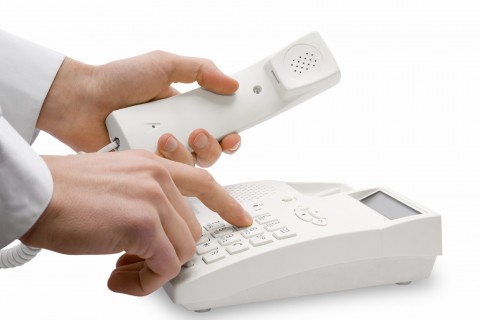
When you first start learning a language, it can be hard enough having face-to-face conversations with native speakers. Can you imagine how challenging a phone conversation would be? During a phone call, we have no body language cues to fall back on—only our own language skills and the patience of our interlocutor.
But listen up, Turkish learners: You no longer need to get tense when making or receiving a call in Turkish!
In this article, we’ll introduce you to Turkish phone terminology as well as several Turkish phone words and phrases to help you navigate your next phone call.
 Table of Contents
Table of Contents
- Phone-Related Vocabulary
- Making a Call
- Receiving a Call
- Phone/Connection Issues
- Sample Turkish Phone Conversations
- Discover More About Turkish with TurkishClass101
1. Phone-Related Vocabulary
Below, you’ll find some useful terms that will make your life easier next time you need to talk about phones or phone conversations in general.
| Turkish | English |
| Telefon | Phone |
| Cep telefonu | Cell phone / Mobile phone |
| Telefon numarası | Phone number |
| Şarj aleti | Charger |
| Sms / Mesaj | SMS |
| Arama / Çağrı | Call |
| Gelen arama | Incoming call |
| Meşgul | Busy |
| Aramak | To call |
| Çalmak | To ring |
| Mesaj bırakmak | To leave a message |
| Sesli mesaj bırakmak | To leave a voicemail |
| Kapatmak | To hang up |
2. Making a Call
Are you hesitant to make a call in Turkish? Are you worried you won’t be able to express yourself correctly?
In this section, you’ll learn a variety of useful phrases for each part of a typical phone conversation in Turkish. To make sure you’re well-equipped for any type of phone call, we’ve included two sets of phrases for each part: formal and informal.

Introduction
Formal
In formal contexts, there are a few different ways of answering the phone in Turkish:
| Turkish | English |
| Merhaba | Hello |
| Günaydın | Good morning |
| İyi günler | Good day |
| İyi akşamlar | Good evening |
Informal
When you’re making an informal call, you can start the conversation one of the following greeting words:
| Turkish | English |
| Alo | Hello |
| Merhaba | Hello |
| Selam | Hi |
The word alo has no literal meaning and it’s only used in phone conversations. The only exception is when it’s used as a slang term, usually to draw someone’s attention if you think they haven’t heard you (or have pretended not to). Please note that it doesn’t sound too polite in this context.
For more useful words and phrases related to introductions, please read our article Turkish Greetings: How to Introduce Yourself in Turkish.
Providing more information
Formal
Now that you’ve greeted the person you called, it’s time to introduce yourself. Here are three ways you could give your name and state where you’re calling from:
| Turkish | English |
| ___ firmasından arıyorum. | I’m calling from ___ company. |
| Ben ___ firmasından John. | This is John from ___ company. |
| Ben ___ firmasının genel müdürü John Denning. | This is the general manager of ___ company, John Denning. |
Informal
In most cases, the receiver will be able to see your name or number come up on their cell phone screen. But if you have a private number or are using a landline, you may need to introduce yourself. Here are a few introductions in Turkish you could use during an informal call:
| Turkish | English | |
| Ben John. | This is John. | |
| John ben. | This is John. | |
| Ben Mary’nin arkadaşı John. | This is Mary’s friend, John. | If you’re calling a friend and someone else picks up the phone, you can introduce yourself this way. |
| Mary’nin arkadaşı John ben. | This is Mary’s friend, John. |

Stating your reason for calling / Making a request
Now, it’s time for you to tell the answering party why you’re calling or whom you’re trying to reach.
Formal
These are common questions or requests you might have when calling a company, store, or business:
| Turkish | English |
| Çalışma saatlerinizi öğrenebilir miyim? | May I ask about your work hours? |
| Adresinizi sormak için aramıştım. | I called to ask for your address. |
| Satın alma müdürünüzle görüşebilir miyim? | May I speak to your Purchasing manager? |
| Finans departmanından biri ile görüşebilir miyim? | Can I speak to someone from the Finance department? |
Informal
Here are some informal Turkish phone phrases you can use to state your reason for calling or to ask for someone:
| Turkish | English | |
| Sinemaya gidelim mi diye sormak için aradım. | I called to ask if we could go to the movies. | |
| Ali’nin numarasını soracaktım. | I was going to ask Ali’s number. | |
| Mehmet ile konuşabilir miyim? | Can I talk to Mehmet? | If you’re calling a friend and one of their family members answers, you can ask for them using one of these phrases. |
| Mehmet evde mi? | Is Mehmet at home? | |
| Mehmet orada mı? | Is Mehmet there? |
Leaving a message
If you’re unable to reach the person you called, you can leave them a message as shown below.
Formal
| Turkish | English |
| Aradığımı söyleyebilir misiniz lütfen? | Could you please tell him/her that I called? |
| Beni aratabilir misiniz lütfen? | Could you please have him/her call me? |
Informal
| Turkish | English |
| Beni aramasını söyler misin? | Can you tell him/her to call me? |
| Notumu iletebilir misin lütfen? | Can you pass on my note, please? |
Concluding a call
Before you hang up, you should thank the receiver and tell them goodbye.
Formal
| Turkish | English |
| Teşekkür ederim, iyi günler. | Thank you, have a good day. |
| Teşekkürler, iyi akşamlar. | Thanks, have a good evening. |
| Hoşçakalın. | Goodbye. |
Informal
| Turkish | English |
| Hoşçakal. | Bye. |
| Bay bay. | Bye-bye. |
| Görüşürüz. | See you. |
If you’d like some more inspiration, we also have a free vocabulary list of the most common ways to say goodbye.
3. Receiving a Call
Are you afraid of picking up the phone if a Turkish speaker calls? That’s quite understandable!
Memorizing and practicing some of the Turkish phone words and phrases below will help you build confidence and enter any phone conversation better prepared.
Answering a call
Formal
Here are some formal greeting words you can use when picking up the phone:
| Turkish | English | |
| Buyurun. | Yes, please. | The word buyurun is used in many different contexts. It also means: “Welcome!” / “Here you go!” / “Have a seat!” / etc. |
| ___ firması, nasıl yardımcı olabilirim? | ___ firm, how may I help you? | |
| Merhaba. | Hello. | |
| Günaydın. | Good morning. | |
| İyi günler. | Good day. | |
| İyi akşamlar. | Good evening. |
Informal
| Turkish | English |
| Alo. | Hello. |
| Merhaba. | Hello. |
| Selam. | Hi. |
Asking for information
If you need to get some info from the caller, the following Turkish phone phrases will help you ask the relevant questions and get the info you’re after.
Formal
| Turkish | English |
| Kiminle görüşüyorum? | With whom am I speaking? |
| Kimsiniz? | Who is this? |
| Nereden arıyorsunuz? | Where are you calling from? |
| Hangi firmadan arıyorsunuz? | Which company are you calling from? |
Informal
| Turkish | English |
| Kim arıyor diyeyim? | Whom should I say is calling? |
Checking availability / Transferring a call
Here are some phrases you can use if the caller asks to speak to someone:
Formal
| Turkish | English |
| Lütfen hatta kalın. | Please stay on the line. |
| Aktarıyorum. | I’m transferring. |

Informal
| Turkish | English |
| Bir saniye, bakayım. | One second, let me check. |
| Veriyorum. | I’m putting him/her on the phone. |
Taking a message
Of course, the person the caller asked for may not be available. In this case, it would be polite to ask if the caller would like to leave them a message.
Formal
| Turkish | English |
| Mesaj bırakmak ister misiniz? | Would you like to leave a message? |
| Bir mesajınız var mıydı? | Did you have a message? |
Informal
| Turkish | English |
| Gelince arasın mı? | Should he call you when he comes? |
| Aradığını söylerim. | I will let him/her know that you called. |
Concluding a call
Formal
| Turkish | English | |
| İyi günler. | Have a good day. | |
| İyi akşamlar. | Have a good evening. | |
| Hoşçakalın. | Goodbye. | |
| Rica ederim. | You are welcome. | You would use this phrase if the calling party thanked you. |
Informal
| Turkish | English |
| Hoşçakal. | Bye. |
| Bay bay. | Bye-bye. |
| Görüşürüz. | See you. |
4. Phone/Connection Issues
When we make a phone call, there’s always a chance we’ll encounter issues of some sort. Whether there’s a bad connection, your phone’s battery is running low, or you didn’t quite understand what the other person said, you can use one of these phrases to express that there’s a problem.
| Turkish | English |
| Pardon, tekrar edebilir misiniz lütfen? | “Sorry, could you say that again please?” |
| Sizi duyamıyorum. | “I can’t hear you.” |
| Sizi çok zor duyabiliyorum. | “I can barely hear you.” |
| Sesiniz gelmiyor. | “I can’t hear you.” |
| Hat kesildi. | “The line has been cut off.” |
| Şarjım bitmek üzere. | “I’m about to run out of battery.” |
| Pardon yanlış oldu. | “Sorry, I dialed the wrong number.” |
| Bağlantı çok kötü. | “The connection is very bad.” |

5. Sample Turkish Phone Conversations
Now that you’ve learned several useful phrases for a phone call in Turkish, it’s time to see how these expressions might be used in a real conversation. Below, you’ll find two Turkish phone conversation examples: one informal and one formal.
Informal
Two friends are talking on the phone and planning to go out to dinner on Saturday evening. Let’s see how their telephone conversation goes.
A: Merhaba. (“Hello.”)
B: Selam, ne haber? (“Hi, what’s up?”)
A: İyilik, senden? (“I’m fine, how about you?”)
B: Ben de iyiyim, sağol. (“I’m fine, too, thank you.”)
A: Cumartesi akşamı ne yapıyorsun? (“What are you doing on Saturday evening?”)
B: Henüz bir planım yok. (“I don’t have a plan yet.”)
A: Yemeğe gidelim mi? (“Shall we go to dinner?”)
B: Olur, tabi. Nereye gidelim? (“Okay, sure. Where shall we go?”)
A: Deniz’in yerine gidelim mi? (“Shall we go to Deniz’s Place?”)
B: Olur ama rezervasyon yaptırmak lazım. (“Okay, but we need to make a reservation.”)
A: Sorun değil, ben hallederim. Saat 8 iyi mi? (“No problem, I’ll take care of it. Is eight o’clock okay?”)
B: Tamam, sağol. Cumartesi akşamı saat 8’de orada görüşürüz o zaman. (“Okay, thank you. I’ll see you there at eight o’clock on Saturday evening, then.”)
A: Okey, görüşürüz. (“Okay, see you.”)
B: Bay bay. (“Bye-bye.”)
Formal
In this Turkish phone call, one of the friends is calling to make a reservation at Deniz’s Place. Note how the tone and language change here to match the formal context.
A: Deniz’in yeri, ben Ece. (“Deniz’s Place, this is Ece.”)
B: İyi günler. Cumartesi akşamı için rezervasyon yaptırmak istiyorum. (“Good day. I’d like to make a reservation for Saturday evening.”)
A: Tabi. Saat kaçta? (“Sure. At what time?”)
B: 8’de lütfen. (“At eight, please.”)
A: Saat 8’de yerimiz mevcut. Kaç kişilik rezervasyon yaptırmak istiyorsunuz? (“We have availability at eight. How many people do you want to make the reservation for?”)
B: İki kişi için. (“For two people.”)
A: 28 Kasım Cumartesi akşamı saat 8 için 2 kişilik rezervasyonunuzu yaptım. Başka yardımcı olabileceğim bir şey varmı? (“I made your reservation for two people for eight on Saturday evening, November 28th. Is there anything else I can help with?”)
B: Yok, teşekkür ederim. İyi günler. (“No, there isn’t. Thank you. Have a good day.”)
A: Rica ederim. İyi günler. (“You are welcome. Have a good day.”)

6. Discover More About Turkish with TurkishClass101
Did you enjoy learning these Turkish phone call phrases with us? We hope that you now feel more confident and prepared for making and taking calls, and that the sample conversations we provided were useful to you.
If you’d like to continue learning useful Turkish words and phrases, then create your free lifetime account on TurkishClass101.com. We provide numerous audio and video lessons, tons of free vocabulary lists, and a variety of other free resources (like this dictionary) that you can refer to. For a more accelerated and personal learning approach, Premium PLUS members can also take advantage of our MyTeacher service which allows you to practice and study with a private teacher.
Always on the go? Then download the app for free and use it wherever you are.
Last but not least, please continue to provide us with feedback so we can continue to improve and best serve your language learning needs!










